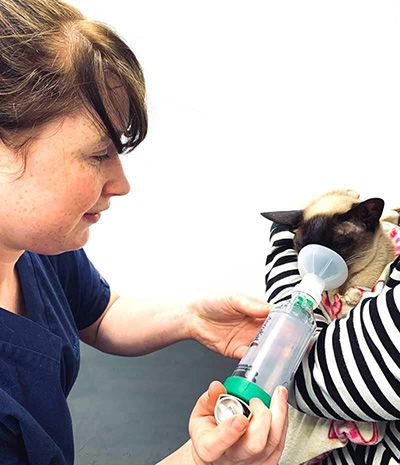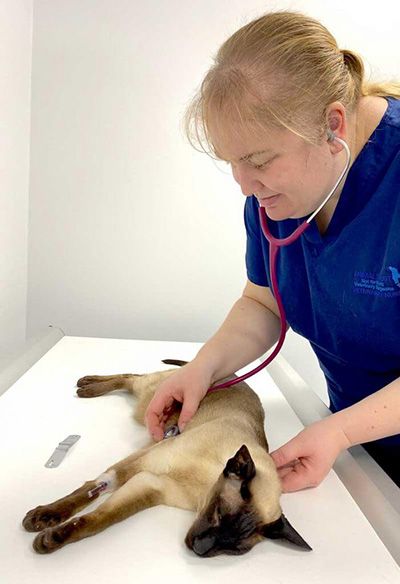
Case of Cat Asthma at Animal Trust Ellesmere Port

It’s estimated that 85,000 cats in Britain are affected by feline asthma, a condition that is triggered by stress and allergies. Here is more of one cat’s story.
When 10-year-old Siamese cat, Charlie, developed an acute cough, his owner Mrs Patrick initially thought he had trouble with fur-balls until the cough became worse.
“When Charlie began coughing regularly — twice per day, I became more concerned that it couldn’t have just been a fur-ball stuck in his throat, so I quickly booked him a free consultation at my local Ellesmere Port surgery.”
Vet, Olga Gluszko, examined Charlie and found that he was experiencing stridor (a high-pitched wheezing sound) in his trachea, which can sometimes be due to tracheitis, a bacterial infection.

Commenting on the case, Olga said; ‘’While Charlie had a wheeze, he wasn’t struggling for breath and was otherwise fine and well in himself. We prescribed him a course of anti-inflammatory medication, which saw his cough improve for a couple of weeks.
“During Charlie’s free follow up consultation, his owner said that, following the course of medication, his cough was still persistent. We moved forward with blood samples and a chest X-ray, which confirmed his diagnosis of feline asthma.
“Feline asthma is an immunity-related condition that is triggered by allergies and usually develops in cats between the ages of 2 – 8. While the condition isn’t curable, it is manageable.” added Olga.
Common signs owners should look out for in their cats include:
- Persistent cough or gagging (as though they have a fur-ball)
- Rapid or difficulty breathing and an increased effort to breathe
- Sneezing or wheezing
- Gasping for breath
- Weakness and lethargy
To diagnose feline asthma, we first listen to the cat’s chest for anything abnormal. From here, we take a blood sample to determine the level of white blood cells which can indicate an inflammation/allergic response. We then perform a chest X-ray to cement the diagnosis which allows us to progress forward and provide the right treatment plan. In Charlie’s case, his owner opted to trial an inhaler, which would help support his condition.

Olga continues; “Charlie will continue to be monitored during free consultations with me in the future, however, so far I’m really pleased with his progress and he is responding well to the treatment.’’
Pet owners should lookout for any changes in their cat’s breathing or if they cough at night when on medication. If you notice any changes, bring them back to your local vet for a check-up.
Charlie’s owner Joanne commented; “Charlie has already made an improvement since being on his inhaler, which I’m so pleased about. I can’t fault the care and attention that the vets and nurses at Animal Trust have given us both — everything has always been explained in good detail.’’
If you’re concerned that your pet may be experiencing symptoms similar to Charlie, book a free consultation with your local Animal Trust surgery.

